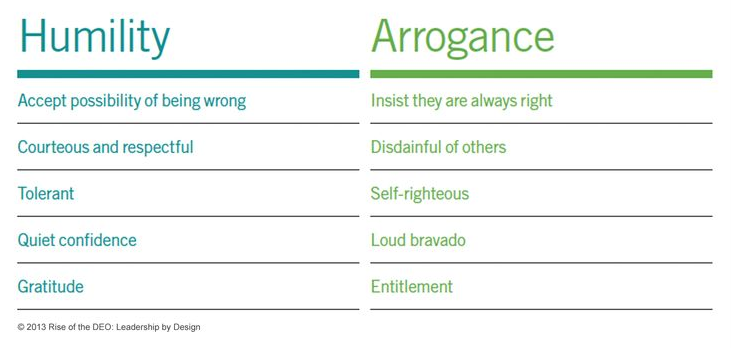Innovation requires humility
Sep 01, 2021
Over the many jobs I have held, the many people I have interacted with, the one thing that impacted my own ability to question norms, contribute innovative ideas…was when the leader I was working with was not humble. In other words, when he/she was a ‘know it all’ and refused to listen to anyone else’s idea. Being humble was not something I learned about while receiving my MBA. However, I have seen it stifle the innovation of every organization I have worked in.
First, let’s define humility by comparing it to arrogance.

How many of us have had leaders, bosses, or co-workers who were arrogant? How many of us have had leaders, bosses, and co-workers who were humble? How did the humble leader work with his/her team versus the arrogant leader? When I worked with humble leaders, myself and my peers were able to collaborate, generate new ideas, and build new processes by questioning norms. I am convinced that without humility, teams will not innovate, will not ask the difficult questions, and will not effectively collaborate.
- When we are humble, everyone is comfortable contributing, learning, and collaborating.
- To be humble means that we admit that we do not have all of the answers.
- To be humble means we value the opinions of everyone on the team, not just our own.
Humility is a trait that is needed up and down the organization but the standard must first be set by management. What can we all do to be humble and set the standard for enabling our organizations to innovate and change? Let’s first start simple with things we can all do on a daily basis. For example:
- I listen more than I speak.
- I encourage everyone to be heard.
- If I disagree, I use words such as ‘tell me more’ or ‘have you thought about’.
- I am comfortable using the words “I don’t know”.
- If I make a mistake I acknowledge it and learn from it.
- I give credit to others for their work.
- While in a discussion, I don’t wait for the first open moment to speak. I try to pause before I ‘chime in’ to ensure the others have finished their thoughts.
- I check my ego at the door.
- I try to remember not every discussion has to be about someone winning and someone loosing.
- If I make a mistake, I don’t blame others or the process. I acknowledge the mistake to others.
- If there is a leadership opportunity, I give it to someone on my team. I empower others to lead.
- When in discussions, I don’t take it personally. It’s a dialog, not a debate.
According to Harvard Business Review, some other ways to build humility include:
- Know what you don’t know.Embrace that you do not know everything. Rely on those who have the experience and expertise.
- Listen, even (no,especially) to the weird ideas. Its when you are humble that you understand that your ideas may or may not be better than the ideas of others. Research tells us that the most imaginative and valuable ideas tend to come from left field. This could be the engineer who rarely leaves his cube, the marketing person who may seem a bit offbeat, the IT employee who is a chatterbox or the customer service supervisor. Leverage the wisdom of your employees. Don’t just listen to your own voice.
- Be passionately curious. Always be seeking out new knowledge and model curiosity to those you work with. In addition, research has found linkages between curiosity and many positive leadership attributes (including emotional and social intelligence). Einstein recognized the value of curiosity when he said: “I have no special talent,” he claimed. “I am only passionately curious.”
Humility is NOT a sign of weakness. It requires substantial inner strength to be able to welcome feedback, understand our limitations, and acknowledge that we do not always have the answer. It takes courage and strength to be humble.


